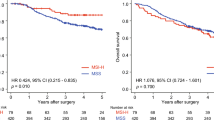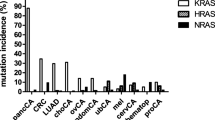Abstract
MLH1 promoter hypermethylation has been described as the primary mechanism for high-frequency microsatellite instability (MSI-H) in sporadic colorectal cancers (CRCs). The underlying molecular mechanism for microsatellite instability (MSI) in synchronous and metachronous CRCs is not well described. A total of 33 metachronous CRC patients and 77 synchronous CRC patients were identified from 2884 consecutive patients undergoing cancer surgery in an academic center. Evaluable tumors were tested for MSI, immunohistochemistry for MLH1 and MSH2 protein expression, and hypermethylation of the MLH1 promoter. MSI-H tumors were found in 12 (36%) metachronous CRC patients and 29 (38%) synchronous CRC patients. MSI-H metachronous CRC patients were younger at index cancer diagnosis (64 vs. 76 years, P = 0.01) and more often were diagnosed before 50 years of age (4 of 12 vs. 0 of 29, P = 0.005). Loss of MLH1 expression associated with promoter hypermethylation was common in all patients, although more common in MSI-H synchronous patients (50% metachronous vs. 83% synchronous, P = 0.03). Overall, MLH1 promoter hypermethylation was seen in 7 of 17 (41%) metachronous and 44 of 54 (81%) synchronous MSI-H CRCs tested (P = 0.004). Although MSI occurred with equal frequency among patients with synchronous and metachronous CRCs, the underlying mechanism for MSI was different. Observed differences in MLH1 promoter hypermethylation and patient characteristics suggest most MSI-H synchronous CRCs in our population were sporadic in origin. In contrast, more MSI-H metachronous CRCs were associated with patient and tumor characteristics suggestive of underlying hereditary nonpolyposis CRC.
Similar content being viewed by others
References
Lynch HT, de la Chapelle A. Hereditary colorectal cancer. N Engl J Med 2003;348:919–932.
Mecklin JP. Frequency of hereditary colorectal carcinoma. Gastroenterology 1987;93:1021–1025.
Rodriguez-Bigas MA, Boland CR, Hamilton SR, Henson DE, Jass JR, Khan PM, Lynch H, Perucho M, Smyrk T, Sobin L, Srivastava S. A National Cancer Institute Workshop on Hereditary Nonpolyposis Colorectal Cancer Syndrome: Meeting highlights and Bethesda guidelines. J Natl Cancer Inst 1997;89:1758–1762.
Aaltonen LA, Salovaara R, Kristo P, Canzian F, Hemminki A, Peltomaki P, Chadwick RB, Kaariainen H, Eskelinen M, Jarvinen H, Mecklin JP, de la Chapelle A. Incidence of hereditary nonpolyposis colorectal cancer and the feasibility of molecular screening for the disease. N Engl J Med 1998;338:1481–1487.
Giardiello FM, Brensinger JD, Petersen GM. AGA technical review on hereditary colorectal cancer and genetic testing. Gastroenterology 2001;121:198–213.
Lynch HT, Smyrk TC, Watson P, Lanspa SJ, Lynch JF, Lynch PM, Cavalieri RJ, Boland CR. Genetics, natural history, tumor spectrum, and pathology of hereditary nonpolyposis colorectal cancer: An updated review. Gastroenterology 1993;104:1535–1549.
Cunningham JM, Kim CY, Christensen ER, Tester DJ, Parc Y, Burgart LJ, Halling KC, McDonnell SK, Schaid DJ, Walsh Vockley C, Kubly V, Nelson H, Michels VV, Thibodeau SN. The frequency of hereditary defective mismatch repair in a prospective series of unselected colorectal carcinomas. Am J Hum Genet 2001;69:780–790.
Cunningham JM, Christensen ER, Tester DJ, Kim CY, Roche PC, Burgart LJ, Thibodeau SN. Hypermethylation of the hMLH1 promoter in colon cancer with microsatellite instability. Cancer Res 1998;58:3455–3460.
Dykes SL, Qui H, Rothenberger DA, Garcia-Aguilar J. Evidence of a preferred molecular pathway in patients with synchronous colorectal cancer. Cancer 2003;98:48–54.
Boland CR, Thibodeau SN, Hamilton SR, Sidransky D, Eshleman JR, Burt RW, Meltzer SJ, Rodriguez-Bigas MA, Fodde R, Ranzani GN, Srivastava S. A National Cancer Institute Workshop on Microsatellite Instability for cancer detection and familial predisposition: Development of international criteria for the determination of microsatellite instability in colorectal cancer. Cancer Res 1998;58:5248–5257.
Herman JG, Graff JR, Myohanen S, Nelkin BD, Baylin S.B. Methylation-specific PCR: A novel PCR assay for methylation status of CpG islands. Proc Natl Acad Sci U S A 1996;93:9821–9826.
Pedroni M, Tamassia MG, Percesepe A, Roncucci L, Benatti P, Lanza G Jr., Gafa R, Di Gregorio C, Fante R, Losi L, Gallinari L, Scorcioni F, Vaccina F, Rossi G, Cesinaro AM, Ponz de Leon M. Microsatellite instability in multiple colorectal tumors. Int J Cancer 1999;81:1–5.
Cawkwell L, Gray S, Murgatroyd H, Sutherland F, Haine L, Longfellow M, O’Loughlin S, Cross D, Kronborg O, Fenger C, Mapstone N, Dixon M, Quirke P. Choice of management strategy for colorectal cancer based on a diagnostic immunohistochemical test for defective mismatch repair. Gut 1999; 45:409–415.
Masubuchi S, Konishi F, Togashi K, Okamoto T, Senba S, Shitoh K, Kashiwagi H, Kanazawa K, Tsukamoto T. The significance of microsatellite instability in predicting the development of metachronous multiple colorectal carcinomas in patients with nonfamilial colorectal carcinoma. Cancer 1999;85:1917–1924.
Sengupta SB, Yiu CY, Boulos PB, De Silva M, Sams VR, Delhanty JD. Genetic instability in patients with metachronous colorectal cancers. Br J Surg 1997;84:996–1000.
Salovaara R, Loukola A, Kristo P, Kaariainen H, Ahtola H, Eskelinen M, Harkonen N, Julkunen R, Kangas E, Ojala S, Tulikoura J, Valkamo E, Jarvinen H, Mecklin JP, Aaltonen LA, de la Chapelle A. Population-based molecular detection of hereditary nonpolyposis colorectal cancer. J Clin Oncol 2000;18:2193–2200.
Samowitz WS, Curtin K, Lin HH, Robertson MA, Schaffer D, Nichols M, Gruenthal K, Leppert MF, Slattery ML. The colon cancer burden of genetically de.ned hereditary nonpolyposis colon cancer. Gastroenterology 2001;121:830–838.
Miyakura Y, Sugano K, Konishi F, Ichikawa A, Maekawa M, Shitoh K, Igarashi S, Kotake K, Koyama Y, Nagai H. Extensive methylation of hMLH1 promoter region predominates in proximal colon cancer with microsatellite instability. Gastroenterology 2001;121:1300–1309.
Abe Y, Masuda H. Genetic alterations of sporadic colorectal cancer with microsatellite instability, especially characteristics of primary multiple colorectal cancers. J Surg Oncol 2000; 74:249–256.
Nicolaides NC, Papadopoulos N, Liu B, Wei YF, Carter KC, Ruben SM, Rosen CA, Haseltine WA, Fleischmann RD, FraserCM, et al. Mutations of two PMShomologues in hereditary nonpolyposis colon cancer. Nature 1994;371:75–80.
Miyaki M, Konishi M, Tanaka K, Kikuchi-Yanoshita R, Muraoka M, Yasuno M, Igari T, Koike M, Chiba M, Mori T. Germline mutation of MSH6 as the cause of hereditary nonpolyposis colorectal cancer. Nat Genet 1997;17:271–272.
Author information
Authors and Affiliations
Corresponding author
Rights and permissions
About this article
Cite this article
Velayos, F.S., Lee, SH., Qiu, H. et al. The mechanism of microsatellite instability is different in synchronous and metachronous colorectal cancer. J Gastrointest Surg 9, 329–335 (2005). https://doi.org/10.1016/j.gassur.2004.05.007
Issue Date:
DOI: https://doi.org/10.1016/j.gassur.2004.05.007




